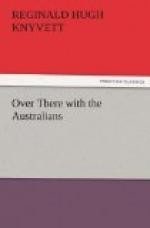Miss Whitford bit her lip to keep from exploding in a sudden gale of mirth. But the sight of her self-appointed chaperon set her off into peals of laughter in spite of herself. Every time she looked at Johnnie she went off into renewed chirrups. He was so homely and so deadly earnest. The little waif was staring at her in perplexed surprise, mouth open and chin fallen. He could see no occasion for gayety at his suggestion. There was nothing subtle about the Runt. In his social code wealth did not figure. A forty-dollar-a-month bronco buster was free to offer advice to the daughter of a millionaire about her matrimonial prospects if it seemed best.
And just now it seemed to Johnnie decidedly best. He scratched his tow head, for he had mulled the whole thing over and decided reluctantly to do his duty by the girl. So far as he could make out, Beatrice Whitford played no favorites in her little court of admirers. Clay Lindsay and Clarendon Bromfield were with her more than any of the others. If she inclined to either of the two, Johnnie could see no evidence of it. She was gay and frank with both, a jolly comrade for a ride, a dinner dance, or a theater party.
This was what troubled Johnnie. Of course she must be in love with Clay and want to marry him, since she was a normal human being. But if she continued to play with Bromfield the Westerner might punish her by sheering off. That was the reason why the Runt was doing his conscientious duty this fine morning.
“Clay ain’t one o’ the common run of cowpunchers, ma’am. You bet you, by jollies, he ain’t. Clay he owns a half-interest in the B-in-a-Box. O’ course it ain’t what he’s got, but what he is that counts. He’s the best darned pilgrim ever I did see.”
“He’s all right, Johnnie,” the girl admitted with an odd little smile. “Do you want me to tell him that I’ll be glad to drop our family friends to meet his approval? I don’t suppose he asked you to speak to me about it, did he?”
The little range-rider missed the irony of this. “No, ma’am, I jest butted in. Mebbe I hadn’t ought to of spoke.”
The frank eyes of the girl met his fairly. A patch of heightened color glowed in her soft cheeks. “That would have been better, Johnnie. But since you have introduced the subject, I’ll tell you that Mr. Lindsay and I are friends. Neither of us has the slightest intention of being anything more. You may not understand such things.”
“No’m,” he admitted humbly. “I reckon I’m a plumb idjit.”
His attitude was so dejected that she relented.
“You needn’t feel badly, Johnnie. There’s no harm done—if you don’t say anything about it to Mr. Lindsay. But I don’t think you were intended for a match-maker. That takes quite a little finesse, doesn’t it?”
The word “finesse” was not in Johnnie’s dictionary, but he acquiesced in her verdict.




